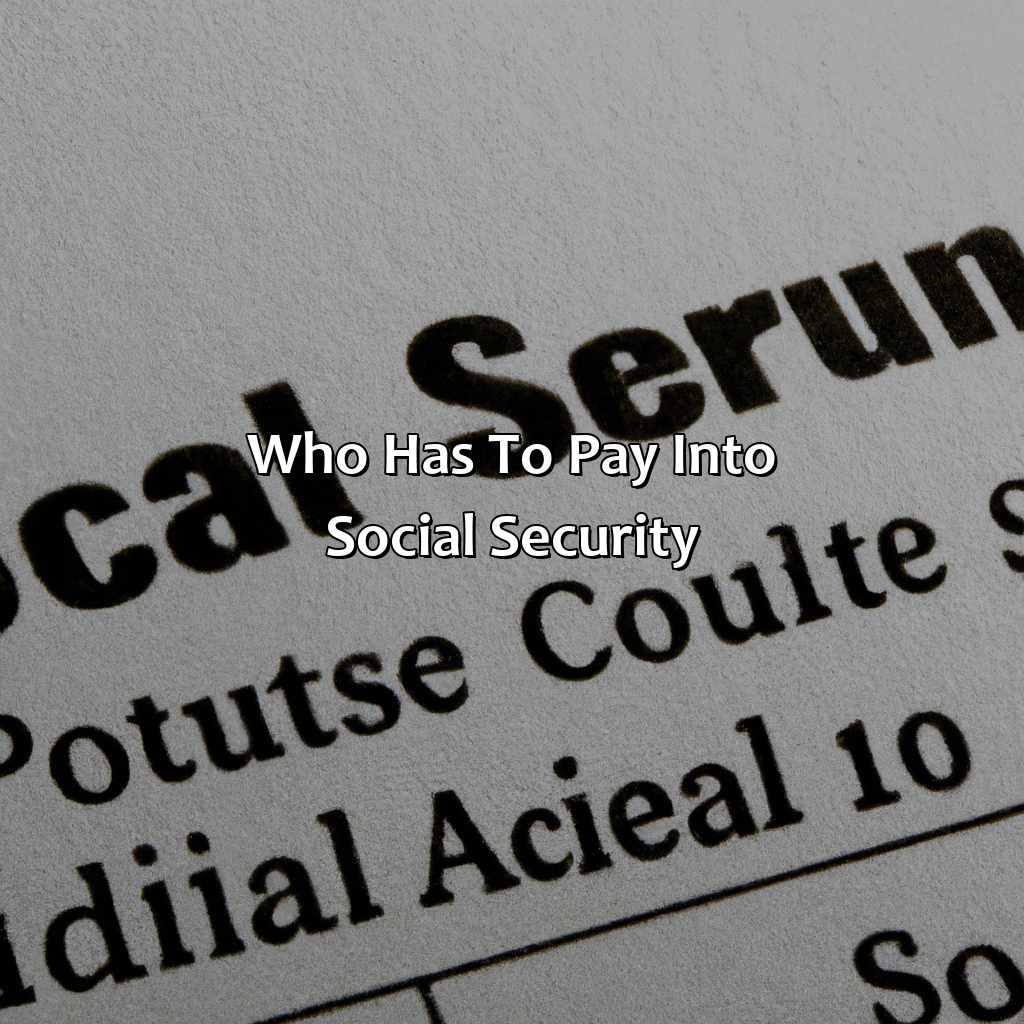Who Has To Pay Into Social Security?
Key Takeaway:
- Social Security contributions are mandatory for most employees, self-employed individuals, and their employers. These contributions fund the Social Security program, which provides retirement, disability, and survivor benefits to eligible recipients.
- Employees and self-employed individuals are required to pay a percentage of their income into the Social Security program, up to a certain cap. Employers must also contribute a matching amount for each employee.
- There are some exceptions to the Social Security contribution requirements, such as for certain government employees, certain religious groups, and non-US citizens. However, most individuals are required to pay into the program.
Are you worried about who has to pay into social security? Knowing who is responsible is an important step in understanding your obligations and making sure you’re meeting them correctly. You need to know the answer! In this article, we’ll explore the requirements for social security payments.
Overview of Social Security
In this article, we explore the key aspects of social security, including its coverage and payment rules. Social security is a government program designed to provide financial assistance to eligible individuals and their families in the event of retirement, disability, or death. It covers a wide range of benefits, such as retirement benefits, survivor benefits, disability benefits, and Medicare. To be eligible for social security benefits, an individual must have worked and paid into the system for a certain number of years. The amount of the benefits received will depend on the individual’s earnings history and other factors. Overall, social security is an essential program that helps millions of Americans maintain their financial security in their later years.
When it comes to payment, both employees and employers are required to contribute to social security. The employee pays a portion of their earnings into the social security system, while the employer matches that contribution. Self-employed individuals are responsible for paying both portions. These funds go towards supporting the social security system and its beneficiaries.
It’s important to note that not all workers are covered by social security. For example, some state and local government workers, as well as certain religious group members, may be exempt from social security coverage. Additionally, non-U.S. citizens may be eligible for social security benefits if they meet certain criteria, such as having paid into the system for a minimum number of years.
Pro Tip: Keep track of your earnings and work history to ensure that you are eligible for social security benefits when the time comes. It’s also important to periodically review your benefits statement to ensure that all earnings have been accurately reported.
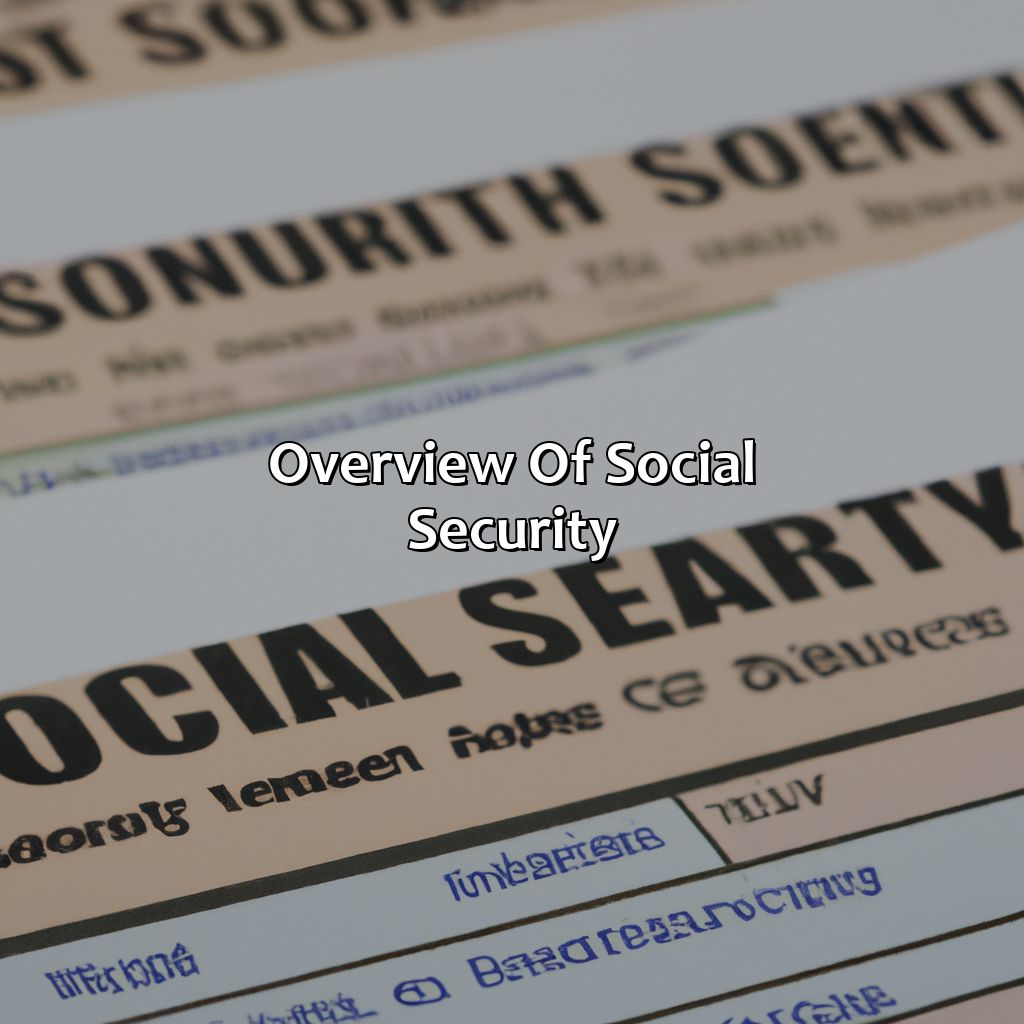
Image credits: retiregenz.com by Joel Duncun
Social Security Contribution Requirements
Who pays into Social Security? To know, you must understand the Social Security Contribution Requirements. Let’s take a look at the particulars for three groups: Employees, Self-Employed Individuals and Employers. Here’s a brief overview of their Social Security contribution requirements.
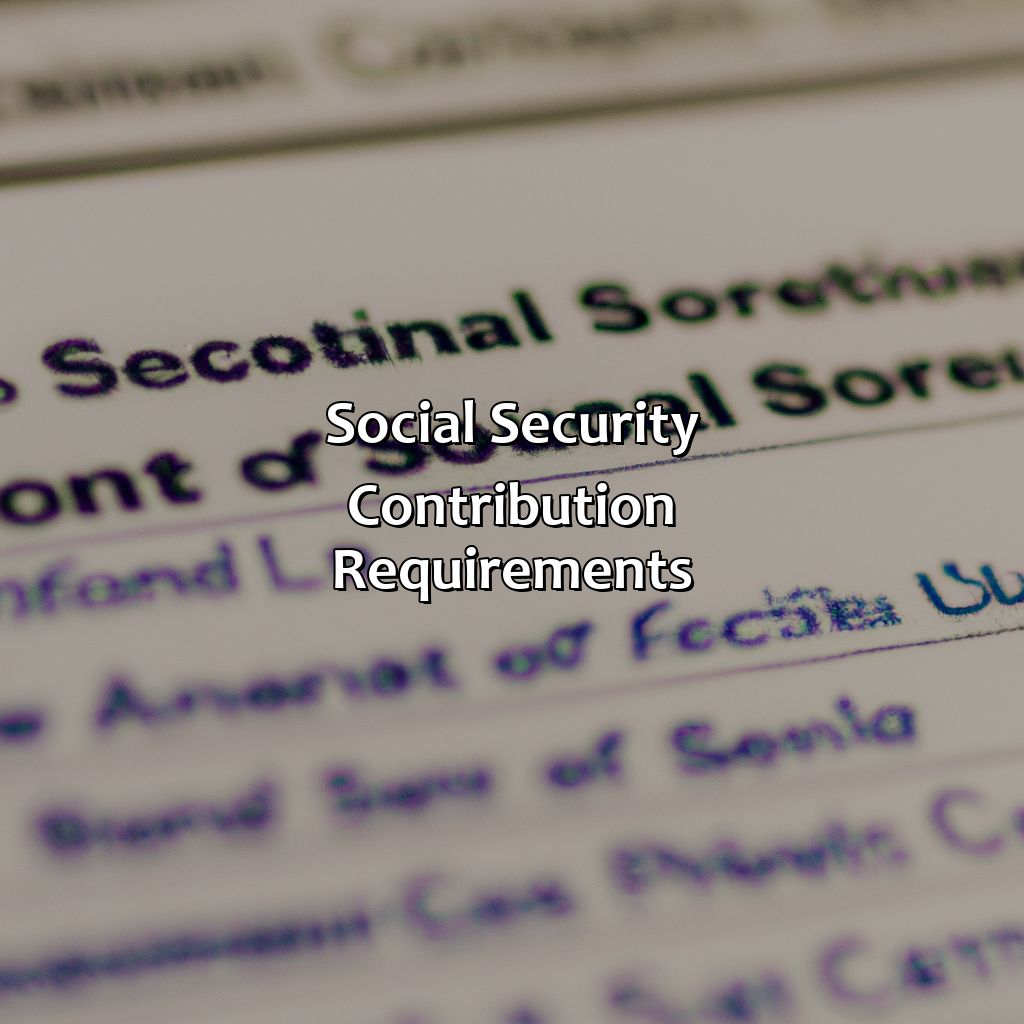
Image credits: retiregenz.com by Joel Duncun
Employees
The social security system demands mandatory contributions from working individuals. Those who have a job and earn a salary are required to contribute their share towards social security. This includes anyone under a formal employment contract, working full-time, and part-time as well.
Furthermore, self-employed individuals also have to make social security payments based on their income generated. These payments will count towards healthcare services, retirement benefits, unemployment benefits, and other therapeutic benefits provided by the state.
It’s worth noting that non-resident employees may be exempt from paying social security in some cases. This exemption could be applicable if they happen to be covered under any bilateral agreement between their home nation and the host country where they work.
Being self-employed means you get to be the boss and employee, but it also means paying your own contributions to social security – talk about a tough boss.
Self-Employed Individuals
Individuals who work for themselves are responsible for Social Security contributions. These contributions are obligatory and mandated by law. Contributions made by self-employed workers are based on their net profits or earnings from self-employment. This includes people who work as freelancers, consultants, or contractors. Self-employed individuals pay both the employee and employer portion of Social Security taxes, which includes an additional 2.9% Medicare tax.
It is important to note that Social Security contributions for self-employed individuals can be different from those paid by traditional employees. While traditional employees work for an employer that withholds and submits Social Security taxes on their behalf, self-employed individuals must calculate and submit their own taxes directly to the government. The amount owed is calculated annually on their tax return.
Many people may not realize that being self-employed means they are responsible for their own Social Security contributions. In fact, prior to 1950 there was no requirement for those who worked for themselves to contribute to Social Security unless they voluntarily chose to do so. However, with the passage of the Self-Employment Contributions Act in 1954, all self-employed individuals were required to make Social Security payments just like employees working for others.
Employers, get ready to break out the checkbook – it’s time to pony up for those Social Security contributions.
Employers
Business entities are required to follow social security contribution requirements. It is mandatory for firms to make contributions toward their employees’ social security. The employer’s portion of the contribution must be paid on time, and it is calculated based on employee salaries including wages, commissions, and bonuses.
These contributions are made in two parts:
- Social Security taxes that include Social Security and Medicare taxes withheld from employees’ paychecks
- The matching contribution from employers.
Employers have additional obligations related to social security contributions that depend on various factors like the size of the company, industry type, status (private or public), business structure etc. Non-compliance can result in penalties or fines.
Pro Tip: Keeping current with applicable laws and regulations will help employers avoid any regulatory issues regarding social security contributions. Even if you’re not exceptional, you might still be exempt from social security contributions.
Exceptions to Social Security Contributions
Delve into the advantages particular groups get regarding Social Security contributions. Such groups include Government Employees, Certain Religious Groups, and Non-US Citizens. Dig deeper to understand who must pay, by learning how these exemptions influence Social Security contributions.
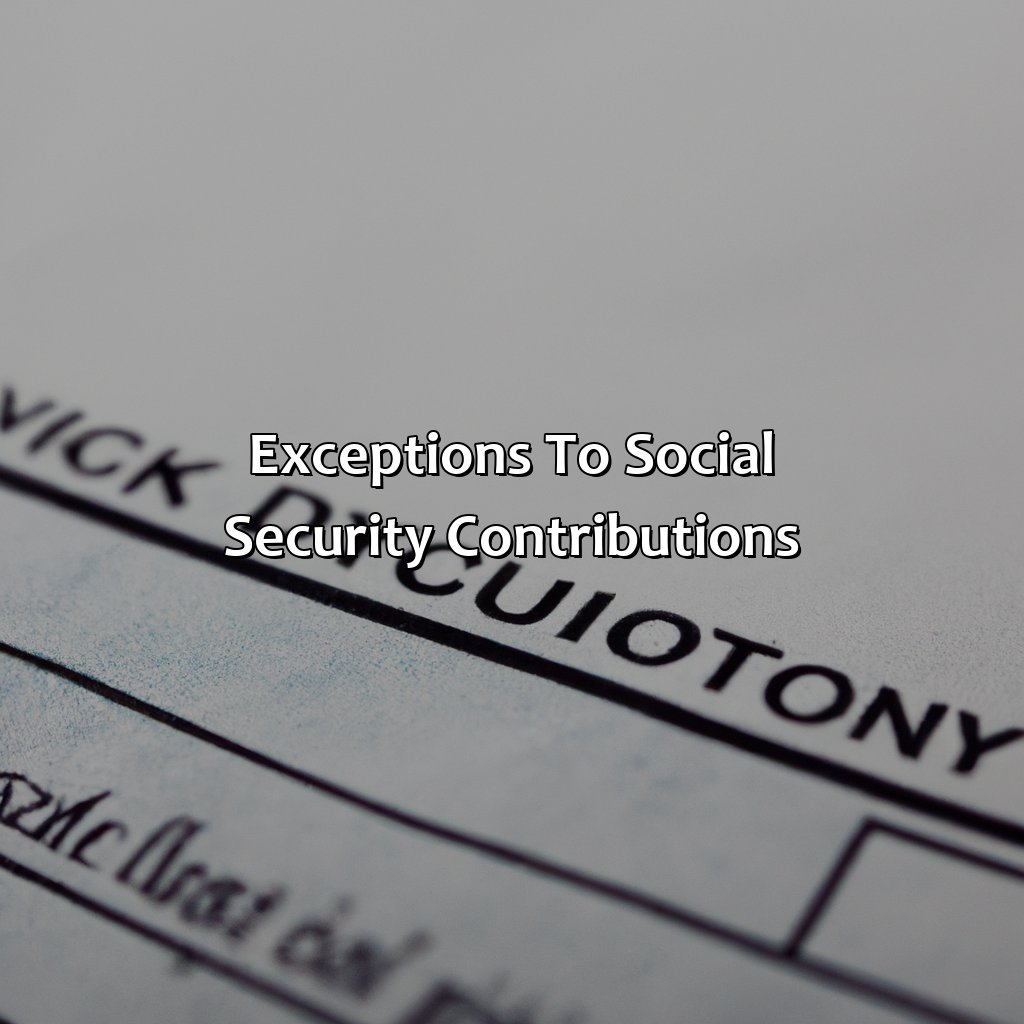
Image credits: retiregenz.com by Adam Arnold
Government Employees
Employees working for the government have certain exceptions to social security contributions. These include those who are part of a pension plan, such as the Federal Employees Retirement System and the Civil Service Retirement System. They are exempt from paying into social security but are still eligible for Medicare benefits.
Government employees in positions that are not covered by a pension plan must pay into both social security and Medicare. However, some state and local government jobs may have their own retirement plans that replace or supplement social security. In these cases, individuals may not have to pay into social security, but they will still be eligible for Medicare.
Pro Tip: It is important for government employees to understand their specific retirement plan and how it affects their social security contributions. Speaking with a financial advisor can help clarify any questions or confusion regarding these policies.
Even if you don’t believe in social security, the government still believes in making you pay – except, of course, if you’re part of a certain religious group.
Certain Religious Groups
Members of some faith groups are exempted from making social security contributions. This exclusion usually arises when the religious organization, to which an employee belongs, is also his employer. Such cases are typical in certain Jewish communities, like the Amish and Mennonites. As employees, these individuals must have a signed statement of their intention not to utilize public welfare benefits and comply with IRS regulations.
In addition to the aforementioned communities, Christian Science practitioners and members that belong to specific sects that oppose social security have also received this exemption status. These organizations must have continuously existed since at least December 31st, 1950.
Notably, there was a court case in 1972 concerning two Jehovah’s Witnesses who had been dismissed for refusing to contribute to social security as it was against their beliefs. They claimed that the provisions for old age benefits were similar to insurance against death or injury; hence it was contrary to their religion. The court ruled in favor of the workers leading Congress to enact amendments allowing exemptions for religious reasons.
Why worry about Social Security contributions when you’re not even sure you’re legally supposed to be in the country?
Non-US Citizens
Individuals who are not citizens of the United States are also subject to Social Security contributions in certain circumstances. Non-US citizens who work in the US and earn income from such employment are generally required to pay into Social Security, unless specific exceptions apply. For example, non-US citizens who are employed by foreign governments, or those with diplomatic status may be exempt from Social Security contributions.
It is important for non-US citizens to understand their obligations when working in the US, as failure to comply with Social Security regulations can result in penalties and potential loss of benefits. Employers also have a responsibility to ensure that their employees meet these requirements. Therefore, it is advisable for both employers and employees to seek professional guidance on matters related to Social Security contributions.
By understanding their obligations under Social Security law, non-US citizens can avoid unnecessary penalties and ensure that they receive the benefits they deserve. Seeking professional advice is crucial for those seeking exemption or clarification on their social security status.
I guess you could say not paying into social security is like playing a game of Russian roulette with your retirement savings.
Consequences of Not Paying into Social Security
Failing to pay into social security could lead to serious consequences, both financial and legal. Employers who do not withhold the required amount from their employees’ wages or self-employed individuals who do not submit the necessary payments may face penalties, interest, and back taxes. Moreover, non-compliance may result in the loss of eligibility for benefits such as retirement, disability, survivors, and Medicare. This can have a major impact on individuals and their families, especially if unexpected events and emergencies arise.
To avoid falling behind and potentially missing out on important safety nets, it is crucial to understand your obligations and take action as soon as possible. Whether you are an employer or a worker, keeping up with social security contributions should be a top priority to ensure financial stability and peace of mind. Taking shortcuts or ignoring the rules may seem tempting or convenient in the short term, but it can have far-reaching and costly consequences in the long run. Don’t risk it, prioritize compliance and stay on top of your social security responsibilities.
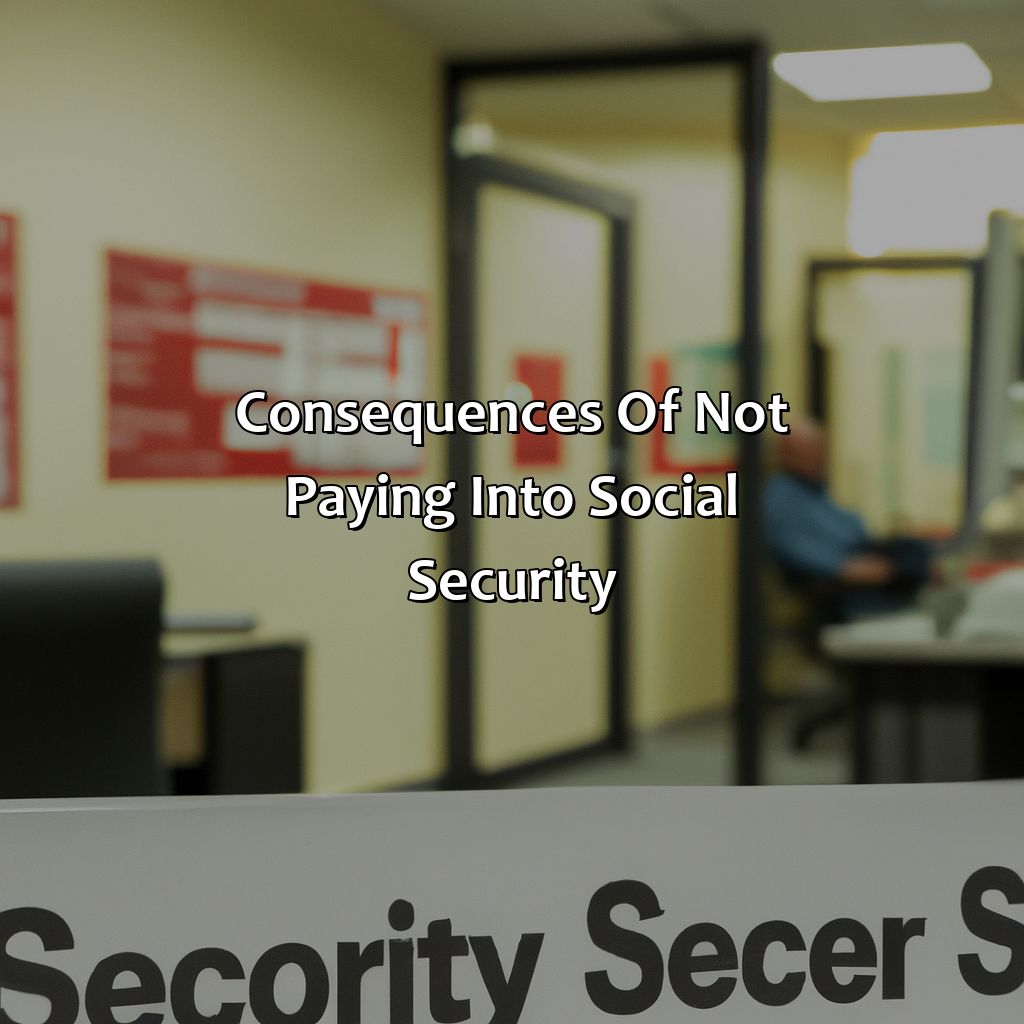
Image credits: retiregenz.com by Harry Woodhock
Five Facts About Who Has to Pay into Social Security:
Most employed individuals in the United States are required to pay into the Social Security program through payroll taxes. (Source: Social Security Administration)
Self-employed individuals are also required to pay into Social Security through self-employment taxes. (Source: Investopedia)
Social Security taxes are imposed on earnings up to a certain limit, which is adjusted annually for inflation. (Source: IRS)
Some state and local government employees may not be required to pay into Social Security, but instead contribute to a separate retirement program. (Source: Social Security Administration)
Social Security benefits are calculated based on the amount of contributions made over an individual’s working career. (Source: AARP)
FAQs about Who Has To Pay Into Social Security?
Who has to pay into social security?
Employers and employees are required to pay into social security.
Do self-employed individuals have to pay into social security?
Yes, self-employed individuals are required to pay both the employee and employer portion of social security taxes.
Are there any exemptions from paying into social security?
Yes, certain religious groups and certain state and local employees may be exempt from paying into social security.
How much do employers and employees have to pay into social security?
Employers and employees are each required to pay 6.2% of qualifying wages into social security, up to a certain earnings limit each year.
Why do I have to pay into social security?
Payment into social security helps to fund retirement benefits, disability benefits, and survivor benefits for individuals and their family members.
What happens if I don’t pay into social security?
Failing to pay into social security can result in penalties and interest charges. It can also affect your eligibility for social security benefits in the future.
 Checkout this IRS Loophole
Checkout this IRS Loophole 
